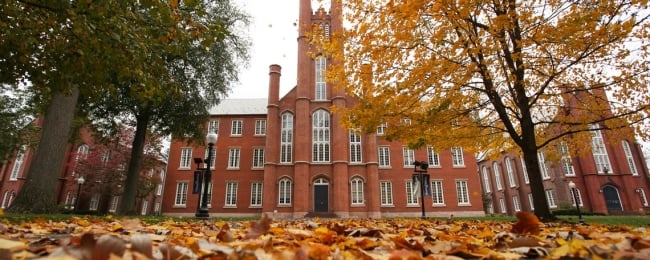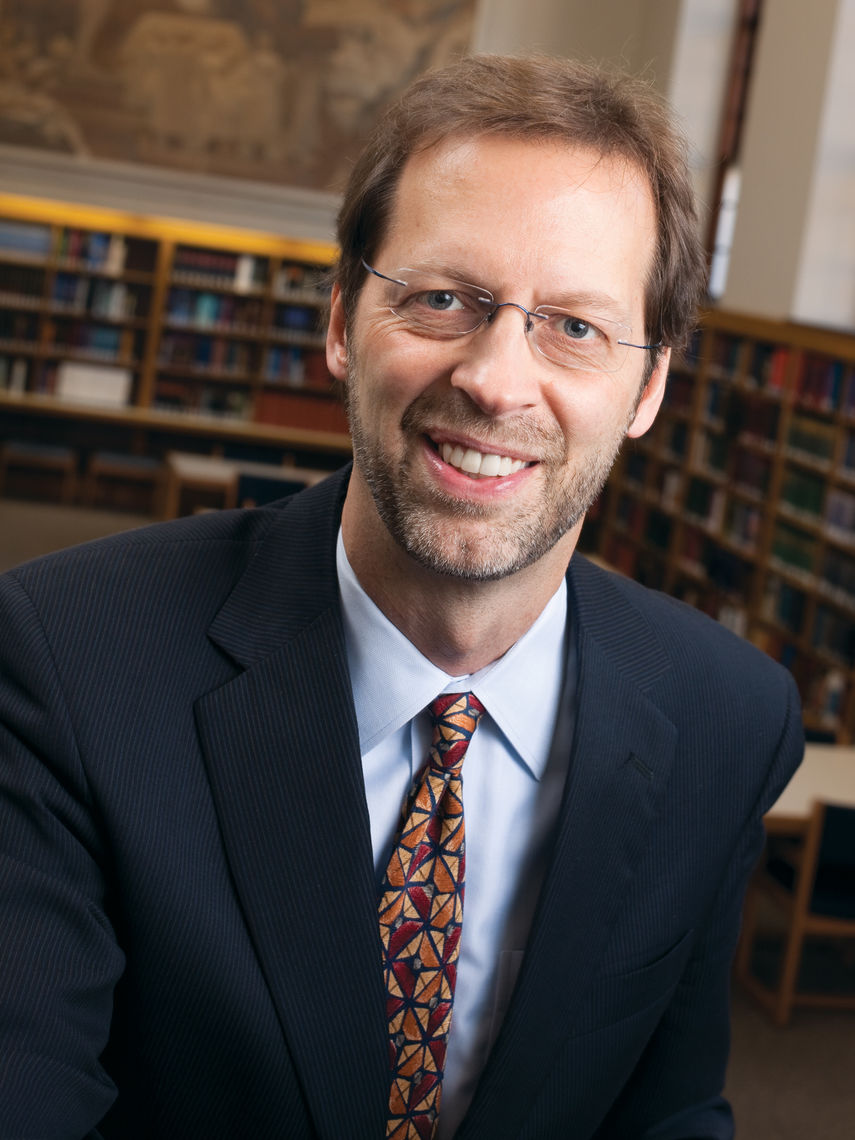You have /5 articles left.
Sign up for a free account or log in.

Franklin & Marshall College
On March 2, students at Middlebury College shouted and chanted to prevent a controversial campus speaker (Charles Murray, co-author of The Bell Curve) from giving a public lecture. The students' action has drawn widespread attention (most of it critical), with many worrying about the state of free expression on college campuses.
That same day, another controversial speaker -- Flemming Rose -- appeared at Franklin & Marshall College. Rose is a Danish journalist who in 2005 -- as culture editor of Jyllands-Posten -- published cartoons of the prophet Muhammad that were criticized by many Muslim groups as blasphemous. Some Muslims organized violent attacks on Western institutions around the world and threatened Rose, while many others criticized him for publishing cartoons that so offended many Muslims.
While Rose has spoken on many college campuses, his appearances are not simple. He is accompanied by a security team. Last year, the University of Cape Town rescinded an invitation for Rose to talk there … on academic freedom.
At Franklin & Marshall, Rose spoke -- without incident, except for some raised voices in conversations before the event -- even as students organized a protest that did not disrupt the lecture.
College officials at F&M are proud of the way their students -- both those who wanted to hear Rose and those who disagree with him -- handled the visit. And they point to both policies and practices at the college that encouraged nondisruptive protest and that might be applied elsewhere.
But F&M officials also say that what happened at the college challenges a popular narrative about higher education being intolerant of ideas that may offend students. The reality, they say, is that nondisruptive protests of speakers are far more common that what happened at Middlebury, and are in fact part of free expression at colleges all over the country.
 "There have been a number of social critics -- in and outside of the academy -- who have labeled an entire generation of students as illiberal crybullies," said Daniel R. Porterfield (right), president of F&M. "If you work at a college campus, you know that these sweeping denunciations are not accurate. Many students in the last two years have protested speech that they felt was offensive to them in a pro-speech manner, but you don't read a lot of descriptions of the media about pro-speech protest."
"There have been a number of social critics -- in and outside of the academy -- who have labeled an entire generation of students as illiberal crybullies," said Daniel R. Porterfield (right), president of F&M. "If you work at a college campus, you know that these sweeping denunciations are not accurate. Many students in the last two years have protested speech that they felt was offensive to them in a pro-speech manner, but you don't read a lot of descriptions of the media about pro-speech protest."
'Crucial Values'
In an interview, Porterfield said that colleges must embrace the importance of free expression all of the time, and not just before a controversial speaker is on campus. To Porterfield, there are three "crucial values" for higher education: academic excellence, freedom of expression and cultivation of a community of inclusiveness and respect. All of these values require constant attention, he said.
So the college regularly organizes events like the Day of Dialogue, in which students and faculty members focus together on diversity. "There is no shortcut to regularly sustained dialogue on campus," Porterfield said.
But the college also states as a matter of policy (and Porterfield personally talks about) the idea that free expression is vital -- even when it offends.
F&M's board this year adopted a statement -- based in part on what was adopted at the University of Chicago -- to make this policy clear. The Rose speech came just a few days after a campus forum to discuss the new policy.
The policy states, in part, "It is not the proper role of the college to attempt to shield individuals from ideas and opinions they find unwelcome, disagreeable, uncivil or even deeply offensive. Rather, members of the college community should be encouraged to act according to the principle that the best response to ideas that they find offensive is speech, not censorship. This approach encourages members of the college community to express their views freely, and freely to take issue with views with which they disagree."
The Rose Invitation and Protest
Rose was invited to Franklin & Marshall by Matthew Hoffman, chair of Judaic studies. In a letter in The College Reporter, the student newspaper, Hoffman wrote of his interest in academic freedom issues and noted that he has invited other controversial speakers in the past because they could illuminate academic freedom issues, even if he didn't agree with their views. For example, he invited Steven Salaita, who lost his job at the University of Illinois at Urbana-Champaign over anti-Israel tweets that many saw as anti-Semitic.
Of Rose, Hoffman wrote that he had recently read Rose's book, The Tyranny of Silence, and was impressed. "Even though I didn’t agree with everything Rose said or did, I admired the complexity of the issues Rose tackled in his book and the clarity and insight of his analysis of these issues," Hoffman wrote. "I had hoped that his visit would be stimulating and thought provoking, inspiring an enduring debate and reflection on these topics. I invited him to speak driven by my belief that in confronting the kinds of difficult and complex issues Rose presents, we all could learn and grow. For me this type of intellectual enterprise is part and parcel of pursuing a liberal arts education in which being exposed to views that one doesn’t like is fundamental to cultivating critical thinking."
In an interview, Hoffman said he knew that some students were concerned about the invitation, but he was surprised to arrive at the site of the lecture to find about 35 students marching outside, with signs such as "Don’t use Muslims as scapegoats to achieve fame." Hoffman said he spoke to several of the students, and that while the discussion was "heated" at times, it was also civil.
As the talk was about to start, the students in the protest came into the lecture hall, standing together in the back and putting down their signs. They then asked many of the questions during the Q&A. The protesting students never blocked anyone's line of sight to the podium and did not disrupt the talk.
Hoffman said he thought some of the students misunderstood the intent of the invitation and Rose's intent in publishing the cartoons -- and that both of these were motivated by support for freedom of expression, not a desire to mock the Muslim faith. Hoffman said he felt bad about the hurt felt by some students, but that he did not think it was wrong to invite Rose.
Douglas Anthony, associate professor of history and chair of international studies at Franklin & Marshall, also spoke to students before the lecture, and encouraged them to participate in the discussion. "I tried to let the students know that they could be part of the discussion," Anthony said. He added that he was glad that they both expressed their frustrations with Rose and questioned him after the lecture.
Middlebury has been criticized for not clearing the lecture hall of those shouting at Murray, and officials there have said that the protests were larger and more intense than expected.
Porterfield declined to say what action the college would have taken had the protest turned disruptive. But he said that the event had an official from student affairs and campus security monitoring, as well as the Rose security detail.
Still, he added, "If something unexpected or unlikely had occurred, we did have appropriate preparations to do the best we could. We're always prepared to do the work necessary to assure that freedom of speech is supported and can occur."
But he stressed that he believes that the ability to support both the right of faculty members and students to host controversial speakers and to protest them in nondisruptive ways is based on promoting values.
This is "not a matter of events management," Porterfield said, but of standing for principles and also "listening to people."
Hate Speech?
Said Bilani is the Franklin & Marshall student who organized the protest. While the students followed the college's guidelines and didn't interrupt the talk, Bilani said via email that he does not believe Rose should have been invited to speak at the college. He and others learned of the Rose appearance only a few days before it happened, he said, and they considered a few alternatives: boycott the event, petition to call off the event or "attend the talk with an open mind, and then challenge the speaker (if needed)."
Bilani said there wasn't time to try to get F&M to reconsider. At the same time, he wrote, the nature of the offense felt by Muslim students was significant and goes beyond disagreeing with Rose's views.
"The speaker invited is infamous for publishing pictures of Prophet Muhammad wearing a turban with a bomb protruding from it," Bilani wrote. "The problem isn’t the tongue-in-cheek bomb or caption, but rather the concept of depicting the prophet by the form of a picture. This is very offensive because, in Islam, Muhammad is not to be conceptualized, depicted nor portrayed."
Bilani said that he believes, after listening to Rose, that Rose's interpretation of Muslim texts is incorrect. He also compared Rose's publication of the cartoons to someone scrawling a swastika in a public place -- and noted that colleges remove swastikas in such situations.
In addressing Rose in the question period, Bilani said he offered this statement: “Flemming Rose, you have your right to freedom of expression, and nobody will take that away from you. There is a line that gets drawn that separates freedom of speech and hate speech -- where you may draw that line may be different than where I draw it.”




